Coastal Processes 2011
Second International Conference on Physical Coastal Processes, Management and Engineering
27 - 29 April 2011
Naples, Italy
Overview
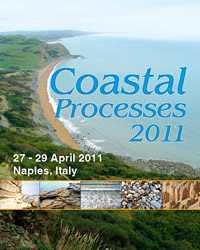 The 2nd International Conference on Physical Coastal Process Management and Engineering took place at the University of Parthenope, Italy. The meeting was organised by the University of Las Palmas (Gran Canaria) and the Wessex Institute of Technology of the UK.
The 2nd International Conference on Physical Coastal Process Management and Engineering took place at the University of Parthenope, Italy. The meeting was organised by the University of Las Palmas (Gran Canaria) and the Wessex Institute of Technology of the UK.
The coastal regions are subjected to increasing pressure due to the demand for building developments and tourism activities in addition to their well established uses. This has increased the need for shore and beach protection, as well as the construction of artificial beaches, ports and harbours. More of the coastlines are subjected to the direct impact of wind, sea, swell and storm-wave activity. In addition, many physical phenomena such as tides, currents, high waves, wind, storm surges and many others can play a significant role in the dynamic behaviour of the coastal zone.
Due to its great socio-economic importance, the physical aspects of coastal processes have been of concern for decades, but recent advances in a number of areas are giving rise to significant progress in this field. In particular, the area of remote sensing and imaging systems has significantly enhanced the monitoring and understanding of coastal processes.
In order to reach satisfactory solutions for the demands imposed on coastal areas and the protection of their environment, one needs to understand very different aspects and their interaction. The problems are essentially interdisciplinary and scientists need to be able to exchange ideas with colleagues from other fields with a variety of different experiences. This research collaboration is essential to improve the quality of coastal regions, including an adequate level of understanding of modelling results and a continuous learning process, based on well documented case studies and field experiments.
Opening Addresses
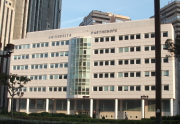 The Meeting was opened by Prof Claudio Quintano, Rector of the University of Parthenope who welcomed the delegates. He explained that the University started nearly 100 years ago as a School of Marine and Maritime Series, a field that the University still pursues in addition to its rapid expansion into many other disciplines. Prof Quintano also referred to the rich cultural heritage of Naples and hoped that the delegates would have time to see some of the most important sites.
The Meeting was opened by Prof Claudio Quintano, Rector of the University of Parthenope who welcomed the delegates. He explained that the University started nearly 100 years ago as a School of Marine and Maritime Series, a field that the University still pursues in addition to its rapid expansion into many other disciplines. Prof Quintano also referred to the rich cultural heritage of Naples and hoped that the delegates would have time to see some of the most important sites.
Professor Raffaele Santamaria, Dean of Science and Technology of the University of Parthenope explained the research carried out at his School and the importance of the Coastal Processes Conference within the activities carried out there.
The next speaker was Professor Carlos A. Brebbia of the Wessex Institute of Technology in the UK, who described the importance of the meetings organised by WIT as a way of achieving knowledge transfer, particularly in interdisciplinary fields such as those affecting processes in coastal areas.
The Institute, as Carlos explained, carries out research at post-graduate level and has PhD and Master programmes, emphasising practical applications and inter-disciplinary research. Many of those programmes are run in collaboration with other institutions. An important part of WIT’s activities is the organisation of courses, workshops and conferences in many different locations in addition to its own campus in the New Forest National Park, in the UK.
Another division of WIT publishes conference proceedings, general monographs and international journals. This gives a wide dissemination to the work presented at the different events organised by WIT as well as the series of monographs produced by WIT associates all over the world.
Carlos continued by explaining the commitment of WIT to improve the quality of its research and services as well as the infrastructure in the New Forest campus, in the midst of a National Park of outstanding beauty. The forthcoming project is the construction of a sports building based on sound engineering and ecological principles. The building’s performance will be monitored with the aim of learning how to continue developing the Campus in an eco-friendly manner within an architectural style in harmony with the site’s heritage.
Opening Lecture by Professor Mark Brown
The technical sessions of the conference were opened by Prof Mark Brown from the Department of Engineering Sciences, University of Florida and Fulbright Distinguished Chair of Engineering and Environment at the University of Parthenope. His lecture on an integrated approach to Coastal Zone management stressed the need to work with interdisciplinary teams in order to solve thire ever increasingly complex problems. Communication is required with all stakeholders across a variety of disciplines.
Invited Lecture by Professor Guido Benassai
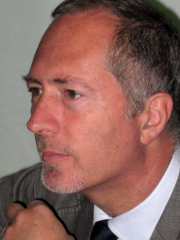
Another invited lecture by Professor Guido Benassai on “A sustainability index for offshore wind farms and open water aquaculture” studied how these areas can be used in an ecologically friendly manner. Guido has defined a sustainability index applicable for large marine areas such as offshore wind farms and aquaculture plants. The index was developed on the basis of a multicriteria evaluation technique. The paper presented a detailed analysis of the environmental sustainability for the case of offshore wind farms in Denmark’s coastal zone.
Invited Presentations
Other invited presentations were:
- “The SPICOSA system approach framework to coastal management” by J. Stottrup, SPICOSA, Denmark.
- “Cartography and remote sensing for coastal erosion analysis” by C. Parente, University Parthenope, Italy.
- “Influence of seasonal sea ice conditions on hydrodynamic processes and oil spill drift”, by R. Aps, University of Tartu, Estonia.
- “The state of the art in Spectral Wave Modelling”, by G. Rodriguez, University of Las Palmas (Gran Canaria), Spain.
- “Recent evolution and the present-day conditions of the Campanian Coastal Plains (South Italy): the case history of the Sele River Coastal plain.” by G. Pappone, University Parthenope, Italy.
Conference Sessions
The other conference papers were grouped into the following sessions;
- Coastal Management
- Coastal Processes and Navigation
- Pollution and Dispersion
- Coastal Geomorphology
- Hydrodynamic Forces
- Coastal Processes and GIS
- Extreme Events and Sea Level Rise
- Sediment Transport and Erosion
- Interaction between Coastal Defences and Processes
Social Events
The delegates had ample occasion to interact with each other during the conference at the coffee breaks, and a series of social functions including a cocktail party at the end of the first day and during the conference banquet and excursion. In additional they had lunch together everyday in a nearby restaurant with excellent food. All these activities helped to strengthen contacts and find ways of collaborating more closely.
Excursion to Pausilypon Archaeological Park and Gaiola Underwater Park
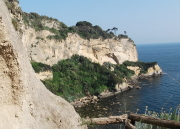 During the afternoon of the second day the delegates and their partners were taken on a guided tour to the Archaeological Park of Pausilypon and an excursion to Gaiola.Underwater Park. The Guide was a member of the Zone Cultural Heritage Centre and fully conversant with the sites. Participants were taken by bus to the entrance of the Cave of Sejanus.in Via Coroglio. Along its 800m length, the history of the cave, its reconstruction techniques and its various special features through its length were explained. Participants were taken to the Archaeological Park of Pausilypon, where they had occasion to admire the remains of the luxurious Ville Pollio, extending over the Posillipo.Hill and overlooking the beautiful bay of Trentaremi. After having visited the area of the Roman Theatre and the Odeon, the delegates and their partners proceeded to the Gaiola
During the afternoon of the second day the delegates and their partners were taken on a guided tour to the Archaeological Park of Pausilypon and an excursion to Gaiola.Underwater Park. The Guide was a member of the Zone Cultural Heritage Centre and fully conversant with the sites. Participants were taken by bus to the entrance of the Cave of Sejanus.in Via Coroglio. Along its 800m length, the history of the cave, its reconstruction techniques and its various special features through its length were explained. Participants were taken to the Archaeological Park of Pausilypon, where they had occasion to admire the remains of the luxurious Ville Pollio, extending over the Posillipo.Hill and overlooking the beautiful bay of Trentaremi. After having visited the area of the Roman Theatre and the Odeon, the delegates and their partners proceeded to the Gaiola 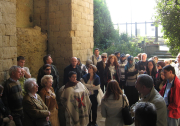 Underwater.Park and Research Centre where a slide presentation took place.
Underwater.Park and Research Centre where a slide presentation took place.
The participants were offered a book entitled “Neapolitan Baroque seen from the Bay of Naples” which served as a guide during the excursion. The book, produced by the Province of Naples, describes the unique heritage of the Bay, including the sumptuous mansions on the coast and their landscape.
International Scientific Advisory Committee
The Scientific Advisory Committee of the Conference met over dinner to discuss the reconvening of the Meeting, which will take place in the Canary Islands in 2013. The discussions also centered on the importance of stressing topics other than Physical Processes, emphasising the need for closer integration of different studies of coastal zones.
Conference Dinner
The conference dinner took place in a well known fish restaurant overlooking the Bay of Naples. There they had a chance to try some of the typical regional dishes accompanied by excellent local wines. The dinner was enjoyed in a friendly atmosphere and helped to strengthen links between the delegates.
Publication of Proceedings
The proceedings of Coastal Processes II, 368pp (Print ISBN: 978-1-84564-534-2; Online ISSN: 1743-3541) are available from WIT Press priced at £158/US$316/€221. Orders can be placed on the WIT Press web site at www.witpress.com or by email:
Papers from the conference will also be hosted online at the WIT eLibrary as Volume 149 of WIT Transactions on Ecology and the Environment (Online ISSN: 1743-3541). For more details visit the WIT eLibrary at http://library.witpress.com


 Wessex Institute
Wessex Institute